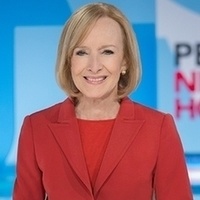
The 2019 Kenner Lecture on Cultural Understanding was given by Judy Woodruff on Tuesday, March 19, 2019, in Zoellner Arts Center. Woodruff received the 2017 Walter Cronkite Award for Excellence in Journalism through her work as an anchor and managing editor for PBS NewsHour. (Courtesy of Lehigh University website)
On March 19, Judy Woodruff, a renowned broadcast journalist as well as the anchor and managing editor for PBS NewsHour, delivered the 22nd Kenner Lecture on Cultural Understanding. Her lecture, titled “Speaking Across Political Differences Today in America,” discussed communication and tolerance in today’s political climate. Woodruff sat down with The Brown and White to discuss her experiences as a woman in the media and the role journalism plays in our democracy.
Q: Your lecture focused on speaking across partisan differences and attitudes in today’s political climate. Why is it important to be able to do this not only as a journalist, but also as a politician and simply as someone living in the United States today?
Judy Woodruff: I think it’s important to think about the time that we’re living in and the political climate — the climate of conversation and dialogue in this country. In my opinion, the division in this country is much more pronounced than it ever has been…When I first came to Washington in 1977 to cover Jimmy Carter, the parties were divided for sure. They disagreed, but they were still able to work together…that is different today and that should, in my mind, be worrying to people. But, at the same time, I’m a journalist. I’m here to cover what’s going on and maybe it is that the American people want there to be a more pronounced division. Maybe they like the harsher rhetoric and the name-calling that I see. But I think it’s something we should be talking about and having a conversation about.
Q: You started your career as a newsroom secretary at a time when women political reporters were few and far between, yet you didn’t let that hold you back. What were some of the biggest challenges you faced as a woman in a male-dominated field and how did you overcome them?
JW: I graduated from college in 1968, so it was in the throes of both the Vietnam War, which was heating up, and more so the Civil Rights Movement…I was an army brat, moving all over the world growing up…I finished high school in Georgia where my father was based in the military and then went to North Carolina for college. It was a time when women — we had seen the beginnings of the women’s movement, which would really flower in the ’70s — but mainly it was a time when women saw their role as staying at home. There were women who were starting to enter the workforce, but not very many. My mother had been a stay-at-home mom and that was what I had seen, but she always said to me ‘diapers and dishes can wait, you want to get your education, have a career, you want to be able to support yourself and be independent.’ I took that to heart. I didn’t know what I was going to do but I was determined to get a college degree. I first looked at math, then at political science and eventually journalism. Frankly, I found in all three, women were just not welcome…Once I settled on journalism I stuck with it, even though when I first looked for a job as a reporter, the news director said ‘well, we already have a woman reporter.’ So, it wasn’t the most fertile ground. But, the women who I know who did succeed and stayed with it have ended up having fabulous careers and have ended up making a difference. The women I met in those early days in Washington, from Lesley Stahl to Andrea Mitchell, they’re still at it, they’re still phenomenal and they’re still setting great examples for young women everywhere.
Q: On top of a demanding journalism career, you are a mother to three children. In a society where working mothers are expected to juggle it all, and are often criticized in doing so, how have you integrated your personal and professional life and found balance?
JW: I think what all women have had to do — because society still looks to women as the principal caregivers to children, parents, family members who are ailing for one reason or another, and frankly for running the household and having a career — is learn how to multitask. The advice I give young women when I’m asked this is, know that you can do it all but you can’t do it all at the same time. Sure, you can have your career and have children, but you can’t give 100 percent to each simultaneously. Say you’re going for a career as a reporter, where the demands are endless and deadlines are constant — you can’t also be there for everything your child needs. So, you have to work out some trade-offs. You either have your spouse involved, you either have caregiving who helps you, or on the job, you have some sort of sharing arrangement. Women have to make those decisions, and I wish society was more supportive than it is. I think our country still has a long way to go in terms of supporting women and their careers.
Q: Up to this point, you’ve covered seven presidents. How have politics and political coverage changed from when you started covering the Carter administration to now with the Trump administration?
JW: It seems almost quaint, how we worked back then. There were only three networks — ABC, CBS and NBC — I happened to be working for NBC at the time. And of course, there were a lot of newspapers. Ironically, today, there are fewer newspapers but there are many, many more sources of news — internet sites, social media, news organizations that have popped up along the way that come with a point of view. But not only that, the technology has changed. Deadlines are constant, reporters are working around the clock — the reporters I know are the hardest working people I’ve ever seen. I don’t know that I could possibly cover the White House today because it’s a non-stop, living, breathing beat that never slows down, particularly under this president who is not a quiet figure to cover. The reporting is constant, the work is constant, you don’t want to make mistakes and you have to be very careful in your work. I would say in covering campaigns and in covering presidents, the other thing (reporters are) dealing with is that (officials) now have their own way of communicating with the public. President (Donald) Trump likes to tweet, other candidates might post YouTube videos, someone else may use Facebook or Instagram. They have their own ways of reaching people, and so reporters have to navigate that new landscape.
Q: How do you uphold the journalistic principles of objectivity and truth-seeking in a time when partisan divides are especially deep and misinformation is becoming more widespread?
JW: I’ve always believed that there is no such thing as objectivity for a reporter because we are all human beings. We are all the sum total of our experiences: where we’ve lived, what we’ve done, the fact that we’re women or men, our age, what kinds of work we’ve done, what we’ve seen in our lifetimes. You put all that together and that is who we are, and yet we still are not to insert our personal views into our reporting. I was taught that. I was taught that ‘people don’t care about what Judy Woodruff thinks, they just want you to go out and do the best job you can gathering the news, bringing it back and reporting it.’ I still believe that. I still believe there is a need for that kind of reporting, although there is much more opinion-reporting going on today. I think it’s harder for the public to distinguish between reporting (they) can count on — what’s fact-based, what’s document-based, research-based — and work that is what someone thinks and what they want you to know. Having said that, there’s always going to be some element of subjectivity in reporting because we can’t include everything in every story. We are leaving information out and by that very act, we are editing what we include and what we tell the public about a given subject…We need to be as conscious as we can about not letting our personal biases interfere. They exist, I mean we’re human beings, but we need to do the best we can to keep them out.
Q: In many ways, the media and the general public are at odds — the media is attempting to garner and maintain trust while the public is contending with so much information and trying to decipher what is credible and what is not. Do you see an end to this conflict, and what advice would you give to journalists and media consumers alike when trying to hone in on the truth?
JW: I wish I had the magic answer to this. In my view, all we can do as journalists is report the news as fairly, honestly and accurately as we can and put it out there for the public to read and to digest. They have to take our word that we’ve done the best we can to be faithful to who we are as journalists, and know that if we are bringing them part of a story, we are going to be as transparent as possible about that…In other words, the more we can share with the public without burdening them with the information — about how we do our work, how many people we’ve talked to, how many documents we looked at, what they were — the more believable we’re going to be…Of course, a lot of really important information comes from people who don’t want to share their names because they might get in trouble for it. That kind of journalism is important, too. You need whistle blowers sometimes to fix things that are wrong in government, in the private sector, in education, the media — we need people who are going to step up and stick their necks out and identify themselves. But some people are not always going to be willing to do that, and yet they have truthful information to share. We have to constantly balance that as reporters, be aware of it and trust that the public will value what we do. I personally believe it’s essential because we don’t have a democracy without a free press.
This Q&A has been edited for clarity and brevity.





Comment policy
Comments posted to The Brown and White website are reviewed by a moderator before being approved. Incendiary speech or harassing language, including comments targeted at individuals, may be deemed unacceptable and not published. Spam and other soliciting will also be declined.
The Brown and White also reserves the right to not publish entirely anonymous comments.
1 Comment
for those that were unable to attend the live Kenner Lecture or were unable to listen live to the WLVR simulcast, this lecture has been archived on the WLVR website to stream anytime http://www.wlvr.org/podcast/kenner-lecture-series-judy-woodruff-3-19-19/